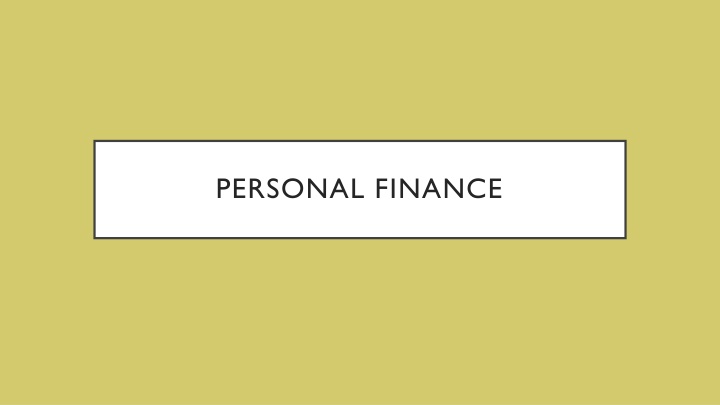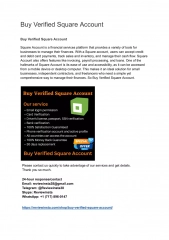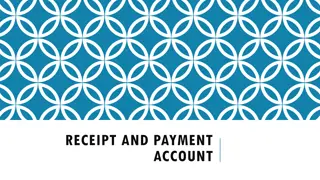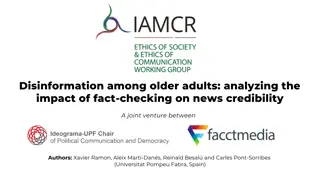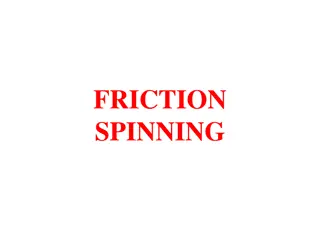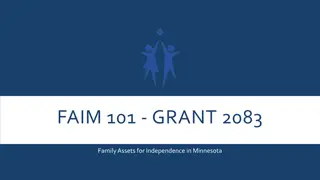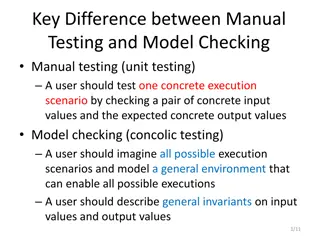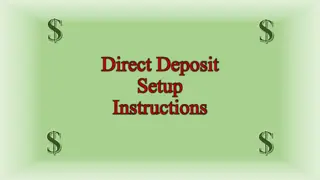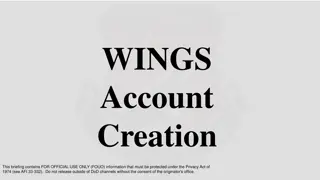Essential Guide to Opening and Managing a Checking Account
Learn the importance of opening a checking account, the process of choosing a bank, criteria to consider, and the steps to open an account. Understand the different services offered by banks and the key factors to keep in mind when selecting a financial institution. Discover the benefits and requirements of having a checking account and how to conduct research to make an informed decision.
Download Presentation

Please find below an Image/Link to download the presentation.
The content on the website is provided AS IS for your information and personal use only. It may not be sold, licensed, or shared on other websites without obtaining consent from the author.If you encounter any issues during the download, it is possible that the publisher has removed the file from their server.
You are allowed to download the files provided on this website for personal or commercial use, subject to the condition that they are used lawfully. All files are the property of their respective owners.
The content on the website is provided AS IS for your information and personal use only. It may not be sold, licensed, or shared on other websites without obtaining consent from the author.
E N D
Presentation Transcript
OPENING AND MANAGING A CHECKING ACCOUNT Before banks were on every corner in America, many Americans stuffed their money in between mattresses and in floor boards to secure their assets. But that wasn t very safe! Today, virtually every American has access to a bank and has a checking and/or savings account with a financial institution.
CHOOSING A BANK Banks offer lots of different services to their customers: Checking/savings accounts & Debit Cards Credit Cards & Loans ATM and Electronic Banking Overdraft Protection Wire Transfers (from employer to employee, or person to person)
CHOOSING A BANK The most common types of bank accounts are checking and savings accounts. Students are able to open new accounts that are connected to their parents and colleges/universities also offer checking accounts to their students free of charge. Checking accounts are used to withdraw money frequently and savings accounts are used to store money in the long-term. Today, we will focus on how to open and manage a checking account.
OPENING AN ACCOUNT To open a checking account, you need some kind of identification, a pay stub and your Social Security number. Most banks also require a small sum of money to be deposited into the account upon opening ($25-100). Some banks offer different perks for opening checking accounts with them, so it s important to shop around: Some banks fees, have minimum deposit requirements, limit the amount or number of withdrawals each month, offer interest, etc.
CRITERIA/PERKS TO CONSIDER Do I have to a minimum balance to avoid fees? Is there a monthly fee? If so, how much? Will I be charged a check writing fee? Is there a debit card transaction limit? How many checks can I write per month? Will the bank return my cancelled checks each month? Will I be charged an ATM fee? What other fees are associated with the account?
DO A LITTLE RESEARCH Look up the minimum requirements to open a checking account with your bank or a bank you re considering opening an account with. What forms of ID are required? Are there any fees associated? Do they offer student accounts? What is the minimum deposit amount required? Be ready to share in just a few minutes!
DEPOSITS Money can be manually or electronically deposited into a checking account. Most employers today use electronic deposit systems but if you receive a check in the mail, you ll have to deposit it into your account manually.
CHECK REGISTER When you open an account, you ll be given a checkbook and (usually) a debit card. The checkbook will come with a check register which is a booklet that allows you to record all of your account transactions. This is super important to do! If you develop good record keeping habits early, it will prevent a lot of trouble later on. Every time you write a check, make a deposit, visit an ATM or use your debit card, take a few seconds and jot it down in your check register.
BALANCING YOUR CHECKBOOK At the end of each month, you will receive a paper/digital statement of your checking account. This will detail all of the activity on your account and will list all of the deposits, withdrawals, fees charged and ATM transactions that occurred. If you don t keep up with your register, how will you know that all of your money is where it should be? When you use your checking account to make a payment, you money travels to lots of different places
HOW TO WRITE A CHECK A check is simply a document that tells your bank to make a payment to another institution on your behalf. A check has some important information on it.
MONDAY, DECEMBER 5 Please grab a Morton s Packet from my desk and work together to complete. When you finish the packet, attempt the FRQ that is on the screen. HW: Study FRQ tomorrow!
MONDAY, DECEMBER 5 Please get out your credit card activity from the weekend and make sure your name is on it. Absent Friday? Get one from the folder on the bookshelf near the door. Current Events today! Notes on Investment after presentations Test is on Thursday!
ITS NEVER TO EARLY TO PLAN FOR THE FUTURE Starting a savings account or choosing to invest your money are really smart ways to plan for your future. Implementing a monthly budget and setting aside each money to save or invest is a great way to get started. Experts recommend saving 10% of your annual income. How much you choose to save and invest now will determine the type of lifestyle you have in the future.
DIFFERENT TYPES OF SAVINGS ACCOUNTS Saving accounts are nice to have because they allow you to set aside money for emergencies, big purchases and the future. There are different type of savings accounts that exist all with their own set of perks! SavingAccounts Money Market Accounts (MMA) Time Deposit (CD) Almost all commercial banks and savings & loan institutions offer these; money deposited into savings accounts will earn interest each year. Acts like a savings account but allows a limited number of checks to be written against account; usually a higher rate of interest but it requires a higher minimum balance too. Certificate of Deposits off a guaranteed interest rate for a specific amount of time the longer them term, the higher the interest. You will be charged a penalty if you withdraw from this account before it matures (term expires).
THINGS TO CONSIDER BEFORE OPENING A SAVINGS ACCOUNT What is the minimum balance? When can I make a withdrawal? Are withdrawals limited? Is it linked to my checking account for overdraft protection? What is the interest rate? Does it compound over time? Are there any fees? The federal Truth in Savings Act is a law that requires all financial institutions to provide you with the answers to these types of questions.
INVESTING Saving is a great way to plan for the future and is relatively risk free . Investing, though risky, allows your dollars the opportunity to grow. You have to decide if you are will to take a risk to earn a big profit. There are different types of investments that you might consider in the future.
BONDS A bond is an IOU that is issued by a corporation or the government as a way for them to borrow money. When you buy a bond, you buy the right to receive a fixed amount of money at some point in the future plus interest! Government bonds are usually more secure than a corporate bond and can be purchased through any bank. Bonds are sometimes also called securities . Bonds are good investments because the face-value of the bond will grow with interest through the duration of the loan .
STOCKS A popular form of investment is stocks. A stock is a share (equity) in the ownership of a company or organization. The more shares you buy, the more ownership of that company that you have. If a firm sells 10,000 shares of stock and your purchase 1,000 of them what percentage of the company do you own? There are two main benefits to owning stocks dividends and capital gains. Dividends profits that are paid to the stockholder Capital gains profit that you can make if you sell your shares of stock for more than you paid for it.
COMMON V. PREFERRED STOCK There are two different types of stocks common and preferred. Preferred stocks earn dividends as a fixed rate each year. Common stocks have a variable dividend rate that varies with their profit and market fluctuations. Preferred shareholders are always paid first; common holders get whatever is left over.
RISKY BUSINESS Stocks are riskier than bonds because stock prices vary based on expected profits. If a firm turns out to be less profitable, dividends will be less and the price of each share will drop. Experts warning if you enter the stock market, be prepared to ride the roller coaster of the market! Sometimes you win and sometimes you lose.
MUTUAL FUNDS The final type of investment is a mutual fund which is an investment in an investing company. Mutual funds combine money that you invest with the money of other investors to make substantial investments in other companies. A major benefit of this is that you are able to diversify your portfolio which experts say is great! You should invest in lots of different types of accounts to spread out and maximize your money. A drawback you don t get to decide where you money goes. There are money market funds, bond funds and stock funds that you can invest in with investment companies. Money market funds are least risky and least profitable stock funds are most risky and most profitable.
LETS SAY THAT YOU HAVE $100,000 TO INVEST. HOW WOULD YOU DIVERSIFY YOUR PORTFOLIO? 1. Choose ten companies and research their stock prices. List the price for each share of stock on your sheet. 2. How many shares would you purchase of each? 3. Would you invest in a bond? Mutual account? 4. Would you put any money in savings?
THURSDAY, DECEMBER 8 Sit at your assigned table you need something to write with for the Multiple Choice Session. When you re finished, put your scantron in the Inbox and make a pile for the test booklets on the counter Use the remainder of class to begin preparing for your final exam Noise should not be at a controlled level as you are only talking with the people at your table.
THURSDAY, DECEMBER 8 Please get out a piece of paper and number 1-32 in two columns (1-16, 17-32) on the front side only. Label it Personal Finance Test be sure your name is on your paper. When finished, put Scantron in the Inbox, test on counter and pick up you semester review. We will work on this in class today, Friday and Monday. This will be due the day you take your exam.
TUESDAY, DECEMBER 5 Current Events Presentations Share investment plans You will need something to write with for the class period.
WEDNESDAY, DECEMBER 7 Today is a silent and independent study day multiple choice test tomorrow. Please use your book, notes, and other resource to help you prepare. Multiple choice test tomorrow! Honors get ready to review for your Personal Finance Test!
FRIDAY, DECEMBER 9 Grab and answer sheet and AP Practice Test from my desk. Work with a partner to complete we will go over the answers on Monday. Partners that score the highest get 5 bonus points on their Final!
FRIDAY, DECEMBER 9 Get out your semester review materials and get busy! Semester Review is due on the day of your exam.
Bring $1 tomorrow and wear your PJs to school. Benefits the Angel Tree Gifts! MONDAY, DECEMBER12 Happy Monday Please grab a practice AP exam and your answer sheet from my desk . If you weren t here Friday get a blank sheet. Double check your answers remember 5 points is on the line! If you re finished, complete the AP Survey on my website worth 20 point Quiz Grade. Tomorrow silent study day. Bring your materials.
Bring $1 tomorrow and wear your PJs to school. Benefits the Angel Tree Gifts! MONDAY, DECEMBER12 Happy Monday Continue working on your Semester Exam Review remember, this is due on the day of your exam. Early Exam Forms? Current Events Tomorrow silent study day/early exams. Bring your materials.
TUESDAY, DECEMBER13 Happy Tuesday It s a silent study day get out whatever materials you need to study with and get busy. Exams begin tomorrow make the most of your 50 minutes.
TUESDAY, DECEMBER13 Happy Tuesday Early Exams today for those who are eligible. Final opportunity for Current Events. It s a silent study day get out whatever materials you need to study with and get busy. Exams begin tomorrow make the most of your 50 minutes.
